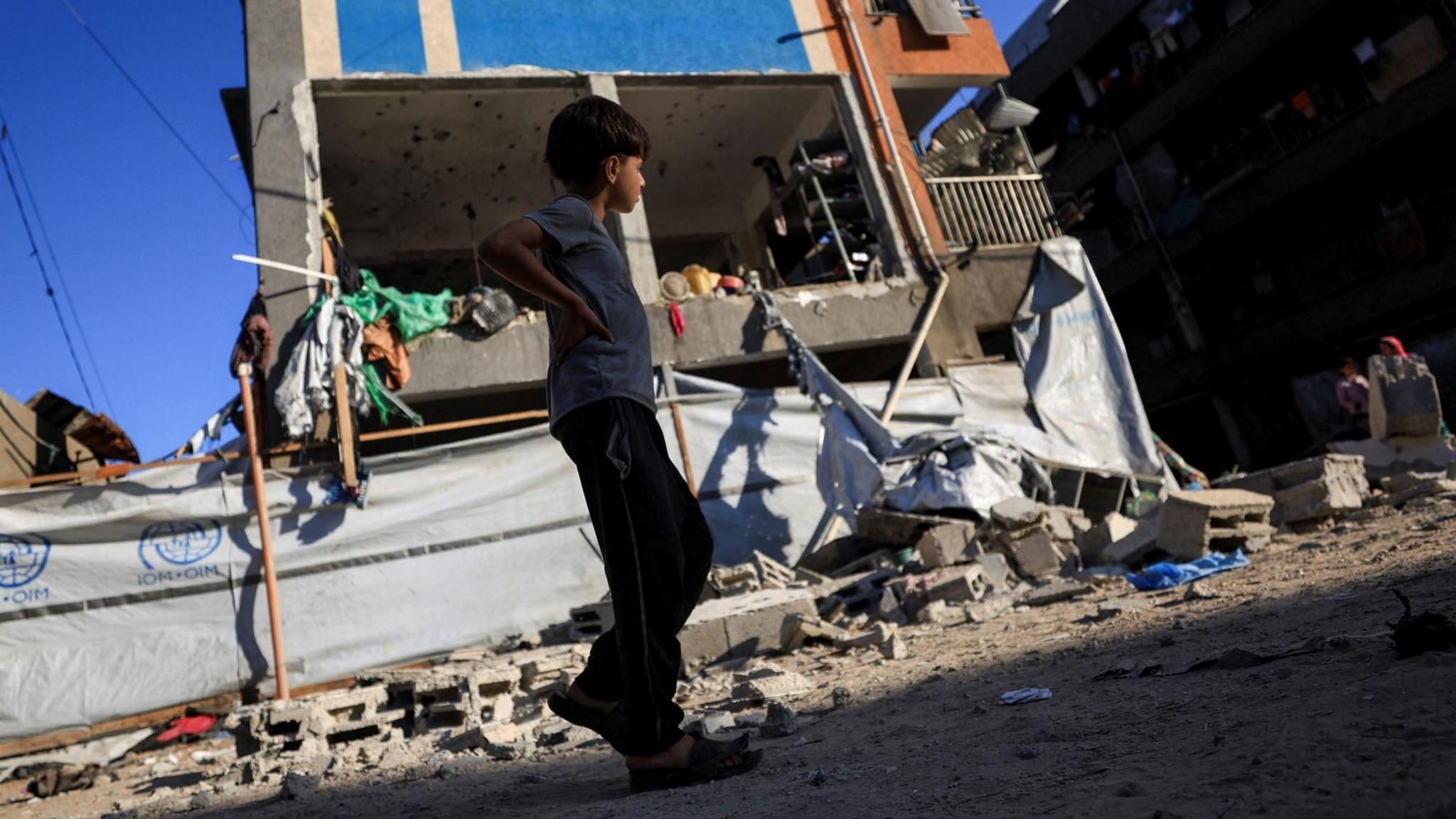Israel sends negotiators to Gaza talks despite 'unacceptable' Hamas demands, PM says

Israeli hostages' families took part in a rally in Tel Aviv to demand a deal that would see them all released
- Published
Israel has decided to send a delegation to Qatar on Sunday for proximity talks with Hamas on the latest proposal for a Gaza ceasefire and hostage release deal.
Israeli Prime Minister Benjamin Netanyahu's office said he had accepted the invitation despite what he described as the "unacceptable" changes that Hamas wanted to make to a plan presented by mediators from Qatar, the US and Egypt.
On Friday night, Hamas said it had delivered a "positive response" to the proposal for a 60-day ceasefire and that it was ready for negotiations.
However, a Palestinian official said the group had sought amendments including a guarantee that hostilities would not resume if talks on a permanent truce failed.
In Gaza itself, the Hamas-run health ministry said on Sunday that 80 people killed in Israeli attacks had arrived at hospitals over the previous 24 hours.
Seven people were killed, including a doctor and his three children, when tents in the al-Mawasi area were bombed on Saturday, according to a hospital in the nearby city of Khan Younis.
On Saturday, two American employees of the controversial aid distribution organisation backed by Israel and the US - the Gaza Humanitarian Foundation (GHF) - were wounded in what it said was a grenade attack at its site in the Khan Younis area.
The Israeli and US governments both blamed Hamas, which has not commented.
Late on Saturday, the Israeli Prime Minister's Office said in a statement that "the changes that Hamas is seeking to make" to the ceasefire proposal were "unacceptable to Israel".
But it added: "In light of an assessment of the situation, Prime Minister Benjamin Netanyahu has directed that the invitation to proximity talks be accepted and that the contacts for the return of our hostages - on the basis of the Qatari proposal that Israel has agreed to - be continued. The negotiating team will leave tomorrow."
Earlier, an Israeli official had briefed local media that there was "something to work with" in the way that Hamas had responded.
Mediators are likely to have their work cut out to bridge the remaining gaps at the indirect talks in Doha.
Watching them closely will be US President Donald Trump, who has been talking up the chances of an agreement in recent days.
On Friday, before he was briefed on Hamas's response, he said it was "good" that the group was positive and that "there could be a Gaza deal next week".
Trump is due to meet Netanyahu on Monday, and it is clear that he would very much like to be able to announce a significant breakthrough then.
The families of Israeli hostages and Palestinians in Gaza will also once again be holding their breath.
Hostages' relatives and thousands of their supporters attended a rally in Tel Aviv on Saturday night to call for a comprehensive deal that would bring home all of the hostages.
Among those who spoke was Yechiel Yehoud. His daughter Arbel Yehoud was released from captivity during the last ceasefire, which Trump helped to broker before he took office and which collapsed when Israel resumed its offensive in March.
"President Trump, thank you for bringing our Arbel back to us. We will be indebted to you for the rest of our lives. Please don't stop, please make a 'big beautiful hostages deal'," he said.

An overnight Israeli strike hit a UN-run school sheltering displaced people in Gaza City
On Tuesday, the US president said that Israel had accepted the "necessary conditions" for a 60-day ceasefire, during which the parties would work to end the war.
The plan is believed to include the staggered release of 10 living Israeli hostages by Hamas and the bodies of 18 other hostages in exchange for Palestinian prisoners held in Israeli jails.
Fifty hostages are still being held in Gaza, at least 20 of whom are believed to be alive.
The proposal also reportedly says sufficient quantities of aid would enter Gaza immediately with the involvement of the UN and the International Committee of the Red Cross.
A senior Palestinian official familiar with the talks told the BBC on Friday that Hamas was demanding aid be distributed exclusively by the UN and its partners, and that the GHF's operations end immediately.
Another amendment demanded by Hamas was about Israeli troop withdrawals, according to the official.
The US proposal is believed to include phased Israeli pull-outs from parts of Gaza. But the official said Hamas wanted troops to return to the positions they held before the last ceasefire collapsed in March, when Israel resumed its offensive.
The official said Hamas also wanted a US guarantee that Israeli air and ground operations would not resume even if the ceasefire ended without a permanent truce.
The proposal is believed to say mediators will guarantee that serious negotiations will take place from day one, and that they can extend the ceasefire if necessary.
The Israeli prime minister has ruled out ending the war until all of the hostages are released and Hamas's military and governing capabilities are destroyed.
Far-right members of his cabinet have also expressed their opposition to the proposed deal.
National Security Minister Itamar Ben-Gvir said on Saturday that the only way to secure the return of the hostages was the "full conquest of the Gaza Strip, a complete halt to so-called 'humanitarian' aid, and the encouragement of emigration" of the Palestinian population.
The Israeli military launched a campaign in Gaza in response to the 7 October 2023 attack, in which about 1,200 people were killed and 251 others were taken hostage.
At least 57,338 people have been killed in Gaza since then, according to the territory's Hamas-run health ministry.